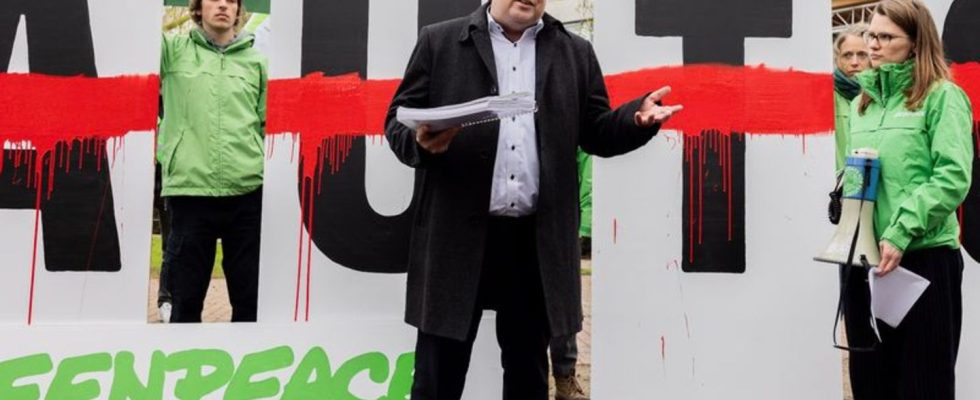Traffic
NRW wants to establish a subsidy for the Deutschlandticket
Greenpeace activists hand over a petition to the NRW Transport Minister Oliver Krischer (Alliance 90/The Greens). photo
© Rolf Vennenbernd/dpa
There have been ongoing disputes between the federal and state governments for months over the financing of the Deutschlandticket. A proposal for securing tickets in the long term is now on the table.
The Deutschlandticket for 49 euros per month can be used nationwide on local and regional transport since May 1, 2023. A good eleven million tickets were recently sold every month. The money from the federal and state governments is needed to compensate for loss of income for transport companies due to cheaper tickets compared to previous offers. According to the Regionalization Act, the federal government will pay 1.5 billion euros a year until 2025 – as will the states as a whole. Over the past few months there has been a lot of hard debate over how to distribute the costs. The transport ministers of the federal states met on Wednesday and discussed in Münster until Thursday. Federal Transport Minister Volker Wissing (FDP) was represented by state secretaries.
NRW warns of price increases for the Deutschlandticket
The paper from NRW Transport Minister Oliver Krischer (Greens) also warns that the three billion euros from the state may not be enough to maintain the current price of 49 euros. There is a risk of “significant price dynamics” with the result that the Germany ticket will have to be offered at “prices that do not meet demand”. According to an agreement reached by the transport ministers in January, the price should actually remain stable at 49 euros per month for 2024. But even that no longer seems to be entirely certain.
Will it stay at 49 euros per month at least this year?
Bavaria’s Transport Minister Christian Bernreiter (CSU) said before the Transport Ministers’ Conference that the decision was made on the basis of a promise from Chancellor Olaf Scholz (SPD) that remaining funds from the previous year could be transferred to this year. It’s about 350 million euros that the states and transport companies urgently need. But nothing has happened here since November.
“If the funds are not transferred, the Germany ticket will have to become more expensive this year, or it will even be phased out completely,” said Bernreiter. He doesn’t want either, because that would be a major loss of trust.
Consumer advice center: Price must remain stable until at least 2030
“We need clear funding commitments from the federal government for the Deutschlandticket from 2026 and finally a binding transfer of federal funds from 2023 to 2024, otherwise there will have to be a renewed discussion about the price level,” said Schleswig-Holstein’s Transport Minister Claus Ruhe Madsen (CDU).
Ramona Pop from the Federal Association of Consumer Organizations called for the price to be kept stable until at least 2030. In order to get even more people onto buses and trains in the long term, secure, permanent financing of the Deutschlandticket is necessary.
Countries want more money
The Association of German Transport Companies (VDV) demands that the discussion at the transport ministers’ conference should not stop at the Deutschlandticket. “We expect that the conference of transport ministers will deal with the overall dramatic situation of public transport financing,” said VDV managing director Alexander Möller. “The industry needs a secure and reliable perspective for the urgently needed expansion and modernization of infrastructure and vehicles as well as financial resources for the nationwide expansion of offerings.”
The availability of buses and trains must be increased, said NRW Transport Minister Krischer. “But for this we need investments in the expansion and maintenance of the railways.” Krischer had already welcomed an “infrastructure fund” proposed by Wissing, in which financial resources for rail, roads and waterways would be pooled for several years. Wissing also wants to mobilize private capital.

